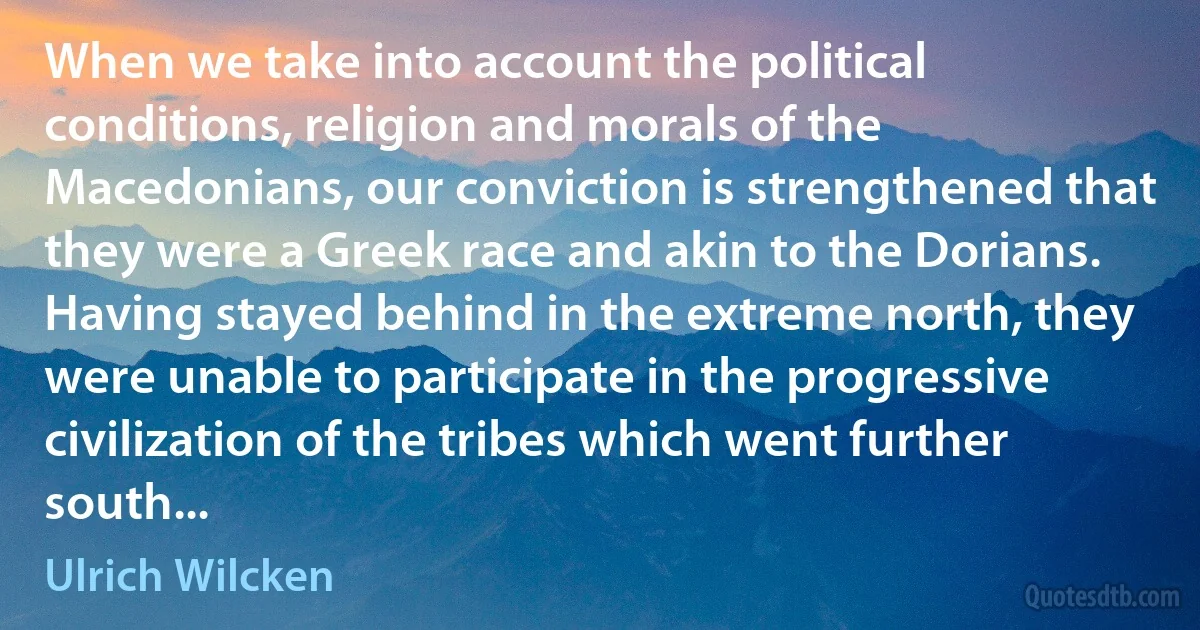Greek Quotes - page 12
....The Greek War of Independence, which came to a successful conclusion in 1832, affected less than one half of the Greeks in the Turkish Empire. It did not bring freedom to the Greeks of Macedonia and Thrace, of Crete and the Aegean Islands, nor to the more than two million Greeks in Asia Minor and Constantinople.

Henry Morgenthau, Sr.
The imagination of these conquered peoples was dazzled by the introduction of Greek art, literature, philosophy, and public works. Though the successors of Alexander were unable to maintain the political control of the lands he conquered, and though successive waves of Roman, Arabian, and Tartar conquests swept over these lands in succeeding centuries, none of the later conquerors has been able wholly to eradicate the influence of Greek culture, nor to exterminate that element of population which was of Greek blood.

Henry Morgenthau, Sr.
the same year in which I began Latin, I made my first commencement in the Greek poet with the Iliad. After I had made some progress in this, my father put Pope's translation into my hands. It was the first English verse I had cared to read, and it became one of the books in which for many years I most delighted: I think I must have read it from twenty to thirty times through. I should not have thought it worth while to mention a taste apparently so natural to boyhood, if I had not, as I think, observed that the keen enjoyment of this brilliant specimen of narrative and versification is not so universal with boys, as I should have expected both a priori and from my individual experience.

John Stuart Mill
The Achaeans of north Greece, which was later to be called Thessaly, seem to have been the great sea-adventurers of the heroic age. With this country were connected the memories of early Greek exploration of the Euxine, in the legend of the ship Argo. And to the Achaeans of Thessaly we must probably refer the earliest notice which preserves the Achaean name in a historical document. An Egyptian writing tells us that they came in company with other peoples "from the lands of the sea" and invaded Egypt in the year 1229 B. C., when Memptah was king. But the great achievement which made the Achaeans illustrious was one in which southern and northern Greece combined-the expedition against Troy.

J. B. Bury
Am I the only person who hopes that David Beckham has sex with Brad Pitt? I don't know who's in charge of casting in Hollywood, but make it happen before one of them is out of their prime. Can you imagine those two men together making love? If there's a man in here that's junk doesn't wiggle just a little bit at the thought of those two men together - this has nothing to do with your homophobic sexual preference. At that level it's art, you monkey. You should be honored that you share the same restroom with those Greek gods.

Daniel Tosh
In the Egyptian and Eastern cosmogonies, and in the Greek version of them, no very definite meaning can, in general, be attached to the term 'destruction of the world,' for sometimes it would seem almost to imply the annihilation of our planetary system, and at others a mere revolution of the surface of the earth.

Charles Lyell
For anyone seeking meaning for his life a figure from Greek mythology comes to mind. It is that of Atlas, bearing with endless perseverance the weight of the heavens on his back. - Atlas, resolutely bearing his burden and accepting his responsibility that gives us the example we seek. To seek out and accept responsibility; to persevere; to be committed to excellence; to be creative and courageous; to be unrelenting in the pursuit of intellectual development; to maintain high standards of ethics and morality; and to bring these basic principles of existence to bear through active participation in life - these are some of my ideas on the goals which must be met to achieve meaning and purpose in life.
And finally, the man who knows his purpose in life accepts praise humbly. He knows whatsoever talents we has were given him by the Lord and that these talents must be developed and used. In this way man renders thanks for the Lord's gift - and finds meaning in his life.

Hyman G. Rickover
What a scandal to hear nature deprecated in comparison to Greek statues by one who knows neither one nor the other without acknowledging that the smallest part of Nature confounds and amazes those who know most. What statue or cast of it might there be that is not copied from divine nature?

Francisco Goya
Motherhood and all the sentimentality that goes with Mother's Day was not congenial to the Greek mind. They were a remarkably unsentimental people; they had no particular reverence for children, nor did they regard them as a special and privileged portion of society. It would not have occurred to them to erect a vast temple to Mickey Mouse. They left that for us.

Robertson Davies
No matter how thoroughly a person may have learned the Greek alphabet, he will never be in a condition to repeat it backwards without further training. But if he chances to set out purposely to learn it backwards, he will probably accomplish this in noticeably shorter time than was the case in the previous learning in the customary order.

Hermann Ebbinghaus
I'm sure one reason that so many Greek myths deal with terrifying, powerful women - Medea, Electra, the Erinyes, the Bacchae, - is that at some point in the misty past, women held a power that was terrifying - terrifying not because they were women whom men felt threatened by, but because they wielded that power in terrifying rituals that almost certainly involved human sacrifice.
This would not be a popular platform on which to base a feminist agenda.

Elizabeth Hand
Every work of art is the child of its age and, in many cases, the mother of our emotions. It follows that each period of culture produces an art of its own which can never be repeated. Efforts to revive the art-principles of the past will at best produce an art that is still-born. It is impossible for us to live and feel, as did the ancient Greeks. In the same way those who strive to follow the Greek methods in sculpture achieve only a similarity of form, the work remaining soulless for all time. Such imitation is mere aping. Externally the monkey completely resembles a human being; he will sit holding a book in front of his nose, and turn over the pages with a thoughtful aspect, but his actions have for him no real meaning.

Wassily Kandinsky
We can begin, like the Scholastic masters, with an objection: videtur quod non ... ""It seems not to be true that..."" And this is the objection: a time like the present [i. e., a few years after the Second World War, in Germany] seems, of all times, not to be a time to speak of leisure. [...]
That is no small objection. But there is also a good answer to it. [...]
For, when we consider the foundations of Western European culture (is it, perhaps, too rash to assume that our re-building will in fact be carried out in a ""Western"" spirit? Indeed, this and no other is the very assumption that is at issue today), one of these foundations is leisure. We can read it in the first chapter of Aristotle's Metaphysics. And the very history of the meaning of the word bears a similar message. The Greek word for leisure (σχολή) is the origin of Latin scola, German Schule, English school. The names for the institutions of education and learning mean ""leisure.""

Josef Pieper
Learned commentaries I have found to store the head with many notions, and often also with the truth of God; but when the Spirit teaches, through the instrumentality of prayer and meditation, the heart is affected. The former kind of knowledge generally puffs up, and is often renounced, when another commentary gives a different opinion, and often also is found good for nothing, when it is to be carried out into practice. The latter kind of knowledge generally humbles, gives joy, leads us nearer to God, and is not easily reasoned away; and having been obtained from God, and thus having entered into the heart, and become our own, is also generally carried out. If the inquirer after truth does not understand the Hebrew and Greek languages, so as to be able to compare the common translation with the original, he may, concerning several passages, get light by an improved rendering, provided he can be sure that the translator was a truly spiritual person.

George Müller
In speaking of agricultural management, the French say, I'economie rurale, and the English, rural economy; and yet neither the one nor the other intend thereby to signify the absolute execution of agricultural operations, but only the division and circumstances or appurtenances of agriculture. In Germany, where a Latin or Greek name has lately been thought to give dignity to a science, and has, consequently, been introduced into the title of most of the scientific works, some authors have begun to term, not only the science of agriculture, but agriculture itself, the oekonomie; and the word is used exclusively in this sense by many persons. It is for this reason that those who are supposed to practise the art with the greatest skill and science, are termed oekonomen (economists); and that some of those who are employed in superintending the labourers, even though they frequently have not the least idea of the actual principles of agriculture, chose to be designated by this title.

Albrecht Thaer



